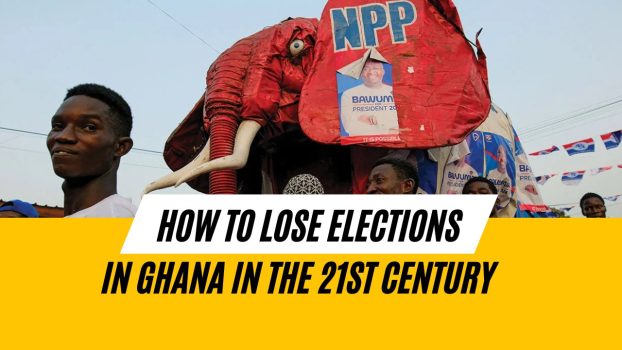Elections in Ghana, as in many other parts of the world, are intricate contests. Winning requires a fine balance of strategy, effective communication, and genuine engagement with the electorate. However, some missteps have become so predictable that they almost guarantee electoral defeat. Here are some of the most common pitfalls that candidates and political parties in Ghana fall into—behaviors that can pave the way for a swift loss.
1. Rushing to Start or Complete Projects at the Eleventh Hour
One of the most glaring missteps is the sudden rush to initiate or complete projects during the election year. Roads that have been neglected for years are hastily constructed, schools are painted overnight, and hospitals are “completed” with no medical staff or equipment. This last-minute effort reeks of desperation and insincerity.
Ghanaians are discerning; they know when such projects are attempts to win votes rather than genuine efforts to improve their lives. Instead of appreciation, this often generates resentment. Many voters interpret these actions as an insult to their intelligence, making them even more determined to vote against the candidates behind these superficial projects.
2. Giving Out Freebies: Water, Electricity, and the Likes
During election seasons, some governments resort to providing free utilities such as water and electricity or distributing food and cash. While this might seem like a gesture of goodwill, it often backfires spectacularly.
Why? Because voters see it as an attempt to buy their votes—a cheap and temporary solution to deeper systemic problems. The electorate is increasingly frustrated by the lack of long-term solutions to issues like unemployment, poor healthcare, and inadequate infrastructure. Freebies feel like a distraction from these pressing concerns, leaving voters angrier than before.
3. Neglecting the Constituency Until Election Season
Another classic blunder is ignoring the electorate for most of the term and reappearing only during campaign periods. Voters are quick to notice when their leaders vanish after elections, only to resurface with grand promises and shiny billboards four years later. This breeds mistrust and apathy.
Successful candidates are those who stay engaged with their constituents year-round, addressing their needs and maintaining an active presence. Anything less is seen as opportunism, and it rarely ends well at the polls.
4. Overpromising and Underdelivering
Making lofty promises that are impossible to keep is a surefire way to alienate voters. When citizens see little to no progress on grand projects or initiatives, they feel betrayed. This sense of betrayal becomes a rallying cry for change, often to the detriment of the incumbent party or candidate.
5. Failing to Address Bread-and-Butter Issues
In Ghana, bread-and-butter issues—jobs, education, healthcare, and security—are central to voters’ concerns. Leaders who focus on superficial achievements or avoid these topics altogether risk losing touch with the electorate. Providing free water during an election year, for instance, is not a substitute for creating jobs or improving living standards.
6. Underestimating the Power of Social Media
In the 21st century, Ghanaian youth, who make up a significant portion of the electorate, are tech-savvy and heavily influenced by social media. A lack of a credible and engaging social media strategy can be a massive disadvantage. Worse still, being tone-deaf on these platforms can lead to public ridicule, which can have lasting effects on a candidate’s image.
7. Disrespecting the Intelligence of Voters
Ghanaians take great pride in their democracy and their ability to discern good leadership. Treating voters as though they can be easily manipulated—whether through freebies, propaganda, or hollow promises. When election season draws near, it’s almost predictable to see Members of Parliament suddenly immersing themselves in activities that they think will endear them to their constituents. They’ll be seen washing clothes in public, pounding fufu with vigor, preparing banku as though it’s their daily routine, or selling items in the market square for the cameras. These performative acts are intended to create a perception of humility and connection with the everyday struggles of the people. However, in an era where voters are becoming more aware and demanding of tangible results, such outdated, superficial gestures often come across as insincere.
Constituents today are more concerned about effective leadership, sustainable development, job creation, quality healthcare, and infrastructure. They want leaders who engage them consistently, address their pressing needs, and advocate for long-term solutions—not just those who make an appearance when election season is near. This archaic style of politics may have worked in the past, but in the 21st century, it risks alienating an electorate that is increasingly informed and eager for meaningful progress. It is a fatal miscalculation. Voters want leaders who respect their intelligence and offer genuine solutions to their challenges.
In summary, losing elections in Ghana often boils down to one key factor: underestimating the electorate. Ghanaians are more politically aware, socially engaged, and vocal about their needs than ever before. Leaders who fail to build trust, neglect year-round engagement, or resort to outdated campaign tactics like last-minute projects and freebies are setting themselves up for failure.
If you aspire to win elections, avoid these blunders. But if you’re intent on losing, by all means, keep rushing projects, doling out freebies, and ignoring the true needs of the people. After all, history shows us how well that works out.
Let me know what you think. Please comment your opinion in the comment section below.







